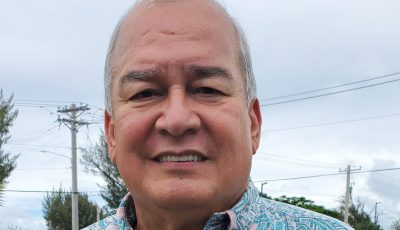Grants: Key to NMI’s goal of diversifying its economy

Tourists enjoy the sunset view in one of the beaches on Saipan before the COVID-19 pandemic struck the world. As the CNMI tourism industry continues to take a hit from the pandemic, federal grants are seen as great assistance to crisis recovery and flow of new investments to the islands. (FIESTA RESORT & SPA SAIPAN PHOTO)
The Governor’s Council of Economic Advisers sees the disaster and relief grants for the CNMI as key in achieving the islands’ goal of having a stronger and more diversified economy.
“The recovery funding we have worked hard to secure is a prime opportunity for us to diversify our economy with new industries and businesses beyond our tourism. Lt. Gov. Arnold I. Palacios and I are committing our administration to streamlining the permitting process for new investments to come in and to fast-track recovery-related construction projects to stimulate our local businesses. We look forward to this collaborative work with our council and our community partners,” said Gov. Ralph DLG Torres, who co-chairs the GCEA with Jerry Tan.
Matt Deleon Guerrero, who chairs the GCEA’s Fiscal Economic Diversification Committee, said that with the tourism industry—the backbone of the Commonwealth’s economy—experiencing its worst period of contraction due to the COVID-19 pandemic, the increase in federal funds that the CNMI is and will be receiving is incredibly influential in continuing to provide the circulation of resources necessary to keep incomes flowing and the economy moving.
These relief funds include Nutrition Assistance Program benefits and Small Business Administration resources that increased consumer expenditures and business operations. The CNMI has been awarded $23,566,886 in NAP grants (for Super Typhoon Yutu) by the U.S. Department of Agriculture and $1,865,563 for Food and Nutrition Services (COVID-19 related aid) courtesy of the Coronavirus Aid, Relief, and Economic Security Act, while the CNMI SBA will receive $88,000, also from the CARES Act.
There are also grants for construction and redevelopment of facilities, which Deleon Guerrero said will provide benefits beyond the construction industry, stimulating activity throughout businesses as incomes from direct compensation and indirect purchases flows into stores, consumer services, and housing.
“Overall, in the pursuit of a diversified set of industries outside of tourism, certain prerequisites need to be supported that permit expansion of alternative industries. Things like increased resources for health care and childcare have been supported through these funds, but more broadly the continuity of demand for restaurants and amenities also play a role in making the CNMI an enticing location for investment,” he said.
Nearly $4 million grants are being provided by the U.S. Department of Health & Human Services through the CARES Act, with $3,253,447 going to the CNMI’s child care program. As for health care, there’s the $4,042,585 grant from the U.S. Department of the Interior.
“The direct support of the CNMI’s community resources and the indirect benefits that stimulate demand garnered for the islands are critical in weathering this crisis and supporting a framework for a stronger and more diversified economy going forward,” Deleon Guerrero said. (PR)



























